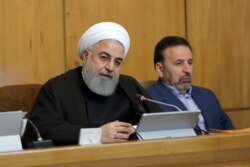This report was updated July 12, 2019, at 4:15 a.m.
VOA Persian's, Michael Lipin and Katherine Ahn contributed to this report.
Britain said Thursday that Iranian military vessels tried to "impede the passage" of a British oil tanker through the Strait of Hormuz.
A British government statement said three Iranian vessels were involved in the incident, and that they backed off when they received a verbal warning from a British warship.
Iran's Islamic Revolutionary Guard Corps denied Britain's accusation. A statement carried by the semiofficial Fars news agency said IRGC navy boats carried out normal duties and had "no clashes with alien boats, especially English boats."
Vice Admiral Jim Malloy, commander of U.S. 5th Fleet, which operates in the region, said in a statement late Thursday that the fleet is aware of IRGC’s “unlawful harassment and attempts to interfere with the passage” of British vessel July 10 and that the U.S. continues “to work with the Royal Navy, along with all our regional and global partners who share in our commitment to preserving and defending the free flow of commerce and the freedom of navigation.”
In a Thursday press briefing, U.S. State Department spokeswoman Morgan Ortagus condemned the IRGC navy, saying it attempted to "unlawfully harass and interfere" with the passage of the British-flagged merchant vessel British Heritage. "We commend the actions of the Royal Navy in ensuring freedom of navigation and the free flow of commerce through this critically important waterway," she added.
Iran's warning
Iranian President Hassan Rouhani had warned Wednesday that Britain would face unspecified "consequences" for its seizure last week of an Iranian oil tanker off the coast of Gibraltar on suspicion of transporting oil to Syria in violation of European Union sanctions.
The IRGC deputy commander, Rear Adm. Ali Fadavi, described the British seizure as an act of "stupidity ... a trait the American president has in spades and the British to some extent."
Tensions in the Persian Gulf region have escalated between Iran and the United States and its allies since last year, when Washington stepped up economic sanctions against Tehran and moved to stop its oil exports as a part of a "maximum pressure" policy to force Iran to end behaviors deemed to undermine regional security.
Tensions began to grow in May 2018 when U.S. President Donald Trump withdrew from a 2015 agreement between Iran and world powers that gave Tehran sanctions relief in return for containing its nuclear program. Trump rejected the deal negotiated by his predecessor, Barack Obama, as too weak on Iran. In response, Iran recently exceeded uranium enrichment limits in breach of the agreement.
British Defense Minister Penny Mordaunt said Britain was concerned about Thursday's disputed incident and urged Iran to "de-escalate the situation."
China and Russia, both signatories to the Iran nuclear deal, also called for restraint.
Global solution urged
The U.S. Central Command said: "Threats to international freedom of navigation require an international solution. The world economy depends on the free flow of commerce, and it is incumbent on all nations to protect and preserve this linchpin of global prosperity."
The Strait of Hormuz is a strategic waterway that is the path to market for much of the Middle East's oil.
In a Thursday interview with VOA Persian, John Hannah, a senior counselor at the Washington-based Foundation for Defense of Democracies, said he believed Iran was trying to spark a shipping crisis in the region. Iranian action could "make it so risky to ship oil through the Persian Gulf that the price of insurance being provided to those tankers goes up so much that it will have a dramatic impact on the price of oil and the overall international economy," Hannah said.
Earlier this week, Marine Gen. Joseph Dunford, chairman of the Joint Chiefs of Staff, said Washington hoped to enlist allies over the next few weeks in a military coalition to safeguard strategic waters off Iran and Yemen. Washington has accused Iran of involvement in bomb attacks on six foreign oil tankers in the Gulf of Oman since May, a charge Tehran denies.
"A naval flotilla that gives assurance to the international shipping and oil community that those ships are going to be secure and arrive at their destinations without being threatened by the Iranian navy is an effort to keep this situation contained and under control," said Hannah.
'Prudent' moves
Barbara Leaf, who served as U.S. ambassador to the United Arab Emirates from 2014 to 2018, told VOA Persian that Iran's alleged harassment of the British oil tanker could prompt other countries to join the proposed U.S. naval coalition in the region. Leaf, a senior fellow at the Washington Institute for Near East Policy, cited India's decision last month to send two warships to the Gulf of Oman to protect Indian merchant vessels passing through the increasingly tense area.
"It's prudent to thicken defenses for commercial shipping not just through the Strait of Hormuz, the most critical choke point for global energy supplies, but also for the Bab-el-Mandeb strait, the choke point at the southern end of the Red Sea. Thickening defenses also is a deterrent against further attacks," Leaf said. "But the other piece that really is required here is de-escalation and diplomacy to drive toward direct discussions and eventually negotiations."






